Countries:Japan / Vietnam
Genre:drama, romance
Keywords:communication, loss, love as suffering
Title:Norwegian Wood/ ノルウェイの森 [Norway Forest / Woods] (2010, TRAN Ahn Hung)
This movie explores the love situations of several young people in the context of loss, loneliness, helplessness, and the role of sex in intimacy:
Naoko (female) who begins the film at age 17, loses her lover Kizuki at age 17 (he kills himself), reencounters Kizuki's best friend Watanabe at 19, makes love to him on her 20th birthday, leaves him for an asylum in the countryside to deal with her psychological pain, kills herself at age 21. Naoko seems to love deeply but cannot respond sexually to the men she loves.
Watanabe begins the film at age 17, loses his best friend Kizuki at age 17 Ihe kills himself), begins sleeping around with women through the influence of his dorm friend Nagasawa, reencounters by chance Kizuki's ex-lover Naoko at age 19, becomes attracted to her and makes love to her at her 20th birthday party, is left behind by her as she goes to the countryside to an asylum to deal with psychological issues, and is pursued by a second woman, Midori while Naoko is gone although he also visits Naoko off and on, loses Midori through an argument, loses Naoko at age 21 through her suicide, makes love to Naoko's companion and nurse Reiko, and begins anew with Midori. Watanabe says that he would like to think of himself as an honest person.
Midori is a young woman with an unclear family situation who seeks devoted love. She loses her father (he dies) and she loses her boyfriend (if he ever existed) through an argument. She choses to pursue Watanabe and gains his attention and probably his affection, loses Watanabe to Naoko as Naoko's crisis deepend, but regains him at the end of the film after Naoko's death. Midori is sometimes manipulative and sometimes not entirely honest. (A student has shared this interesting tidbit: "I don't know if you already are aware of this or if this is relevant information for the class at all but Kiko Mizuhara who plays Midori in Norwegian Wood is actually half Zainichi Korean and half American (she was born in Texas). I just thought it might be interesting because we talked in class about the "global" quality of the film itself.")
Nagasawa, a stylish self-interested and intelligent friend of Watanabe, is someone who has slept with at least 70 women but also has a steady girlfriend that he does little to make feel secure. This girlfriend, Hatsumi, remains devoted to him despite his infidelities. However, he leaves her for going abroad once he enters the Foreign Ministry. She marries someone else but kills herself two years later, either still in love with Nagasawa or grieving too heavily the loss of that relationship.
This film is lyrical in presentation and not strongly driven by plot. Although quite a bit happens plot developments don't cause a lot of reaction among the characters. They are pretty much who they are regardless of the situation or where they are on the timeline of the film.
The film presents a challenge in terms of extracting meaning. Based on Haruki Murakami's novel of the same name, it is as obscure as that novel. While it would seem to be about the pain caused by loss (especially of one's lover or friend), there are three suicides in this film) I would suggest that it is instead a film about some sort of intense, unidentifiable psychological pain that comes from an inability to love and that the losses are only symbolic of the pain, not the cause of the pain.
The film also presents a challenge in where to position it in its Japanese cultural context. Murakami has tried hard to be an international writer. He has resisted cinematizing his novels and when he finally allowed Norwegian Wood to go to screen, it is by a Vietnamese director known for his interpretation of the Vietnamese landscape. The director does not even understand Japanese. It is set in a student dorm during upheavals of the 1960s and in a countryside that could be in any country; neither of these are strongly marked out as Japanese. Characters seem to float outside of a real world. Nevertheless, what interests me about this film for this class is that despite these conscious distancings from Japanese culture, this movie is deeply involved in "helpless before fate" and "love as pain" which are qualities we have seen in many other Asian films. Further, communication as limited with much kept to oneself is another characteristic we see in other films. And communication in general is an interesting topic for this film (inability to communicate sexually, letters from Naoko to Watanabe, letters from Reiko about Naoko to Watanabe, and so on). Finally, dreaminess is something we consider in this class and all the characters in this film seem to be breathing a green haze of some sort.
Music
When Watanabe tries to reach Naoko after they had slept together for the first time, and he learns she has moved away. He write a letter of apology to her. The next scene is him at work, with the song by Can called "Mary, Mary So Contrary" playing in the background. Here's its lyrics:
Mary, oh Mary, so quite contrary,
How does your garden grow?
These silver bells and cockle shells
And pretty men all in our room,
When you see contrary Mary,
Told her eye, refuse to terry.
We spoke very soft and slow
Without your pretty men, Mary,
Standing in a row.
Mary, Mary, Mary, Mary.
Smoke a high cool cigarette,
Turn around and then we left,
Smiling as the way began to grow,
We got your pretty men all in a row.
Mary, Mary, so quite contrary,
How does your garden grow?
These silver bells and cockle shells
And pretty men all in our room,
Mary, Mary, Mary, Mary,
Mary, Mary, Mary, Mary,
Mary, Mary, Mary, Mary,
Mary, Mary, Mary, Mary.
When you see contrary Mary,
Told her eye, refuse to terry.
We spoke very soft and slow,
We got your pretty men standing in a row.
Mary, Mary, Mary, Mary, Mary, Mary,
Mary, Mary, Mary, Mary, Mary, Mary,
Mary, Mary, Mary, Mary, Mary, Mary,
Mary, Mary, Mary, Mary, Mary, Mary,
Mary, Mary, Mary, Mary, Mary, Mary,
Mary, Mary, Mary, Mary, Mary, Mary,
Mary, Mary, Mary, Mary, Mary, Mary,
Mary, Mary, Mary, Mary, Mary, Mary.
And you can see how well these lyrics fit into the title song lyrices ("Norwegian Wood" by The Beatles):
I once had a girl, or should I say, she once had me...
She showed me her room, isn't it good, norwegian wood?
She asked me to stay and she told me to sit anywhere,
So I looked around and I noticed there wasn't a chair.
I sat on a rug, biding my time, drinking her wine.
We talked until two and then she said, "It's time for bed"
She told me she worked in the morning and started to laugh.
I told her I didn't and crawled off to sleep in the bath
And when I awoke, I was alone, this bird had flown
So I lit a fire, isn't it good, norwegian wood.
And another song that shows women bringing trouble. After Midori and Watanabe kiss for the first time, the next scene is Watanabe at his record shop. The song by Can, "She Brings the Rain" plays in the background briefly. The lyrics:
Yes, I care if she brings me spring,
But don't care about nothing,
She brings the rain,
Oh yeah, she brings the rain.
In the dawn of the silvery day
Clouds seem to melt away,
She brings the rain,
Oh yeah, she brings the rain.
She brings the rain, it feels like spring,
Magic mushrooms out of dreams,
She brings the rain,
Oh yeah, she brings the rain.
Cement of Yellow, grey disappears,
Flying on the raven's wing,
She brings the rain,
Oh yeah, she brings the rain.
Yes I care, she brings me spring,
But don't care about nothing,
She brings the rain,
Oh yeah, she brings the rain.
She brings the rain, it feels like spring,
Magic mushrooms out of things,
She brings the rain, it feels like spring,
She brings the rain, it feels like spring,
She brings the rain, it feels like spring,
She brings the rain.
In the dawn of the silvery day
Clouds seem to melt away,
She brings the rain,
Oh yeah, she brings the rain,
Oh yeah, she brings the rain,
Oh yeah, she brings the rain,
Oh yeah, she brings the rain.
And, by the way, this Web site claims to feature all the music references in the book, which are extensive: memoirs of aleisha blog
When Midori travels to Nara, breaks up with her boyfriends, travels alone, thinks of Watanabe, then calls him to a bar, and he doesn't seem to know she loves him and she is so hurt that she walks out ("I never dreamed you would answer like that") in the next scene the must is The Doors "Indian Summer" with these lyrics:
I love you, the best
Better than all the rest
I love you, the best
Better than all the rest
That I meet in the summer
Indian summer
That I meet in the summer
Indian summer
I love you, the best
Better than all the rest
Hmm.

Watanabe (in love with Naoko, Midori)
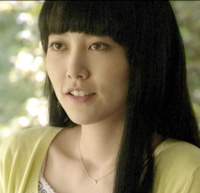
Naoko (in love with Kizuki, perhaps in love with Watanabe)
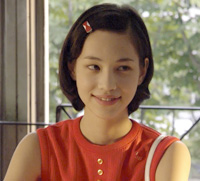
Midori (perhaps in love with Watanabe, if she is capable of feeling love)

Kizuki with Naoko (in love with Naoko, but dead)
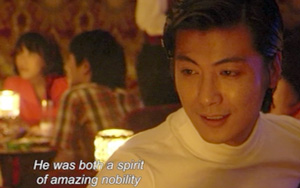
Nagasawa (in love with himself)
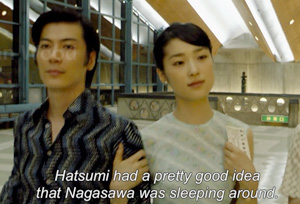
Hatsumi (hopeless and fatally in love with Nagasawa)
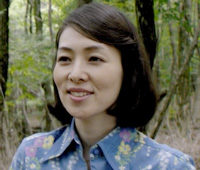
Reiko (takes care of Naoko and, in a way, in love with her)